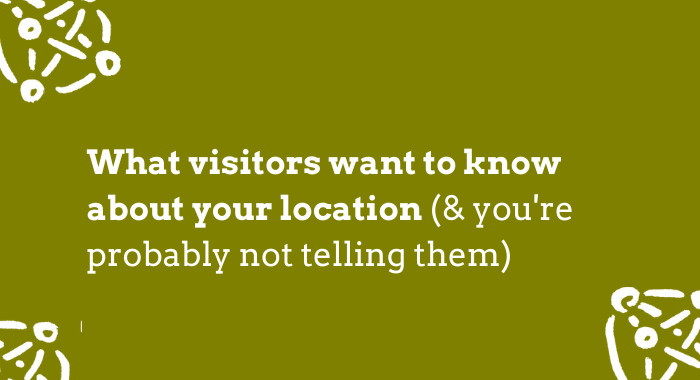What every visitor wants to know about your location

"Location, location, location" are said to be the three things that most affect property values. Location's also crucial to the success of tourism businesses.
I'm not sure we recognise and use location enough, or in the right way.
Of course, every tourism business gives their address. They might add a map, or include a mention of their 'fantastic location' on the home page of their website. All fine, but you can use your location in many other ways to attract visitors and enhance your search engine rankings.
Here's a quick checklist:
Where is your business? Give the context as well as your address. People near you might recognise the name of your beautiful village but those further away won't have a clue. Say where or what you're near or between, especially if any of those places are well known and likely to be something people search for. Be precise, and include travelling times. You can even say something about the journey and why it's enjoyable, or what to look out for on the way.
What's your location known for? This might be obvious, but state it. Not everyone will know. If it's not known for anything, you can choose something and make it a strength - best views and sunrises, a place where nothing ever happens (attractive to many), a place with the oddest gravestones (I once worked for a destination where that was a claim to fame!), where locals do something like put on an amazing event or where there are a few characters everyone loves to meet.
Where's the 'best'? It doesn't matter what it is - tell people where the best walks are, the best places to buy x, the best views, the best local events, best places to take Aunt Nellie, or to exhaust children... whatever you can think of to show off your local knowledge.
How can people get to you? Explain your location in terms of access, and remember that means different things to different people. Remember that an increasing number of people will want to know about electric vehicle charging points. Think about how visitors can 'give their car a holiday' with alternative transport options and ideas for local explorations.
What's unusual or different or special, in or near your location? It could be something man-made, something connected to local people, or more natural. If you talk about something from history, make sure it's relevant to today's visitors and that there's something related to the history that they can see or experience now.
How can visitors experience your area? Consider your location through the senses. For example: hear the birdsong (can you say which birds?) or the river flowing, see the sunrise or evening light on the local church, smell the best breakfast in x or the wonderful aroma of z in the garden, taste the best x, feel your shoulders relax as you wander barefoot over the lawn...
What could be their concerns about your area? For example, some visitors might need to be convinced there's enough to do, or something they can do if it rains, or places to eat. Think through possible concerns and try to address them in advance.
What are your recommendations for getting the best out of time in your area? Most visitors want to see something, do something, eat something, buy something, learn something. What can you suggest?
If most of your visitors come from nearby, you might not need so much detail. As a rule of thumb, the further your visitors travel, the more information you need to give them about your location.
Adding this kind of information to your website has several benefits: it helps visitors enjoy their time with you more, it encourages new visitors, reduces questions and helps with search engine rankings and local collaborations.


0 comments
Leave a comment